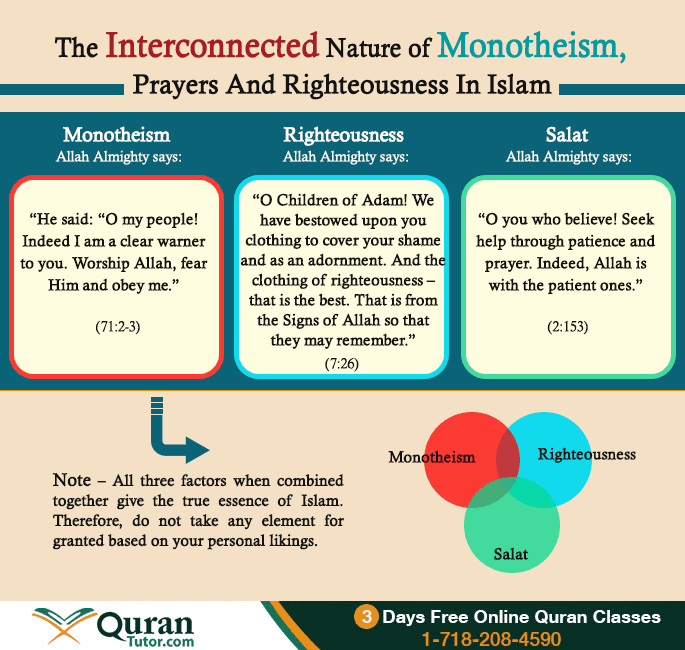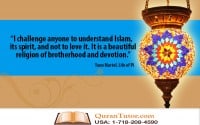The Interconnected Nature of Monotheism, Prayers & Righteousness in Islam
The beauty of the religion Islam is that each and every tenet of it is connected and all these tenets when combined give the whole structure of Islam. Although the tenets can be viewed analyzed and implemented in isolation as well, however, when one gets to analyze the essence of the tenets they all share the same essence and they all are intertwined and related with each other.

Perhaps the major problem of Muslims of today is that they tend to keep tenets of Islam in isolation and separate from each other. This results in minimal understanding of the whole essence of Islam. In this regard, Muslims of today keep prayers, monotheism and righteousness separate from each other and view them in isolation. The lines below discuss how these three elements are interconnected.
Monotheism:
Islam is a monotheistic religion that preaches Oneness of Allah Almighty where there is no other deity other than Allah Almighty and all of the people and the universe are His creation, therefore, He is the only one worthy of Worship and no one stands equal to Him.
Muslims know that Prophet Muhammad (PBUH) came with the message of monotheism, but this message is not something, which Allah Almighty sent to people through Prophet (PBUH) only, rather it is the basic premise of all the preaching that came with all the Prophets before Muhammad (PBUH) as Allah says about the preaching of Prophet Nuh (AS) in Quran:
“He said: “O my people! Indeed I am a clear warner to you. Worship Allah, fear Him and obey me.” (71:2-3)
From this ayah of Quran it is clear that like Prophet Muhammad (PBUH) who preached the message of Tauwheed, Prophet Nuh (AS) also preached the message of monotheism to his people. This oneness of Allah was what Prophet Moses (AS) preached to his people and all the Prophets that came before or after Him. Therefore, without monotheism the foundation of Islam cannot be laid and if the foundation is not laid properly or it is faulty and thus one cannot progress further in Islam.
Righteousness:
Another important preaching of Islam is righteousness. Islam wants its followers to move on the path of righteousness so that in addition to living this life of theirs in a successful way, they may also be eligible for the bounties of the hereafter as well. This is why Islam tells its followers to search for the path of righteousness and once they are on that path, they should stick with it and avoid any kind of deviation by resisting the evil temptations. In Quran, Allah Almighty says:

“O Children of Adam! We have bestowed upon you clothing to cover your shame and as an adornment. And the clothing of righteousness – that is the best. That is from the Signs of Allah so that they may remember.” (7:26)
From this ayah of Quran it is clear that the clothing of righteousness is a Sign of Allah, meaning that all the people in this universe were born with the element of righteousness in them and all are born righteous, however, it is afterwards in this life what they do is what makes them or break them. Therefore, righteousness is what humans are born with and it is what they should strive to achieve in their lives.
Salat:
Five times a day are an obligation upon every Muslim. It is the second pillar of Islam and in any case a mulslim is supposed to offer prayer five times a day on their prescribed time. Therefore, this is why Muslims across the world ensure that they are familiar with prayer timings and know the direction of Qibla along with fulfilling other requisites of prayer so that they could offer them in the right way. In Quran, Allah Almighty says:

“O you who believe! Seek help through patience and prayer. Indeed, Allah is with the patient ones.” (2:153)
From the ayah it is clear that the help of Allah Almighty could be asked for with the help of prayers. It means that a prayer is also a means of invocation that helps a Muslim supplicate to Allah Almighty.
The Intertwining Between The Three:
The individual importance of these three elements has been discussed in the lines above, however, what a Muslim needs to understand is that these factors when combined are that give the true essence of Islam and one cannot simply follow one factor and let go of the other element of liking or disliking. The lines below discuss how these factors are intertwined with each other and how the assist and compliment in achievement of one another.
Giving traits of Mutaqens Allah Almighty says in Quran:

“Your real protecting friends are Allah, His Rasool and the fellow believers, the ones who establish Salah, pay Zakah and bow down humbly before Allah.” (5:55)
From this ayah of Quran it is clear that the believers will be those who establish Salah and bow down in front of Allah Almighty humbly, thus, it shows that the mere performance of Salah is an attestation of the Oneness of Allah. Therefore, considering that one could offer Salah and still believe in multiple gods would be a false belief.
At another place in Quran Allah Almighty describes the qualities of believer in the following way:
“You are the best nation which has ever been raised for the guidance of mankind. You enjoin good, forbid evil, and believe in Allah.” (3:110)
From this ayah of Quran it is clear that in order to be a true believer on has to enjoin in good. This good is what is righteousness, however, this righteousness needs to be complemented with the believe in Allah Almighty. Therefore, one cannot be a believer if someone is righteous and does not believe in Allah and vice versa.
At another place in Quran Allah Almighty tells of the benefits of prayer in the following way:

“Indeed, prayer prevents from immorality and evil deeds, and surely the remembrance of Allah is greatest, and Allah knows what you do.” (29:45)
From this ayah also it is clear that Salat helps in prevention from evil doing. In other words Salat helps a person stick to the path of righteousness, therefore, a Salat that does not prevent a person from doing wrong things needs to be reconsidered and righteousness in action is to be complemented with Salah, because Allah knows everything.
Conclusion:
In a nutshell, although there is a need of studying and analyzing the tenets of Islam in isolation, however, there is a strong intertwining essence in them and all of these elements when analyzed in combination give the whole essence of Islam.









